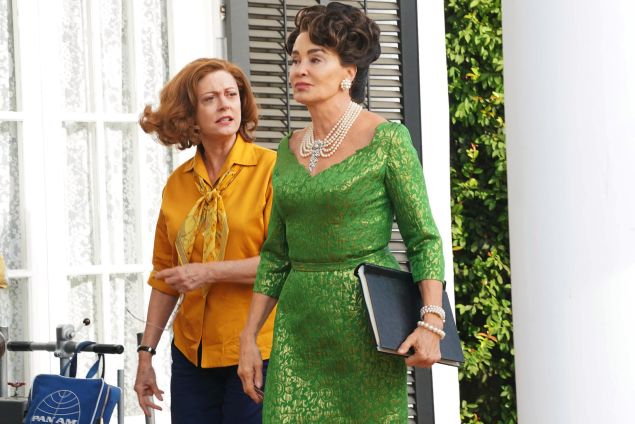In the penultimate episode of the series, Bette gains creative control and Joan loses everything, while B.D. and Mamacita get out while they still can. Here's Jorge...

Feud doesn’t play favorites. The show has done a good job (for the most part) at digging down into why these two screen legends acted the way they did towards each other. And they’ve made a point (over and over and over) that they were not as different as the world saw them; they were actually very similar, acting from the same place of desperation and clinginess to relevance.
In this week’s episode. Joan repeatedly boycotts the production of Hush, Hush… Sweet Charlotte, unable to cope with the creative control that Bette has over her as a producer. This eventually ends with her being fired from the picture, and Olivia de Havilland stepping in; the only actress willing to take her spot and also Bette's dear friend...

But while the show may not pick teams in regards of heroines vs villainesses, it does seem to lean more heavily towards Joan’s POV. This episode (directed by Helen Hunt) is almost entirely viewed through her eyes: the way Bette whispers to Bob Aldrich (Alfred Molina) in between takes, trimming down her monologues; waking up in a boozed frenzy in her trailer to find she’s been abandoned by the crew; receiving her legal termination… Joan is being mercilessly beaten up throughout the episode.
She is no innocent victim, though. Her pitiful last strokes to stay afloat have turned her into someone impossible, that has pushed everyone aside (she has a riveting small encounter with Pauline, who just wants out of the business by now; give her a spinoff!). Even her loyal lackey Mamacita has had enough with yet another vase thrown at her. The industry has turned Joan into a monster, and no one wants to work with monsters.
 Bette Davis, on the other hand, tries to stay afloat on her own turf, seeing the production of her movie being jeopardized, and thus putting at risk the one chance she had to be taken seriously once again. She projects this anxiety into her daughter, when B.D. announces she is to be married. If she can’t control the set, she will control that. And it goes as well as you’d expect, with B.D. reinforcing once again that all Bette does is for her own benefit. But that’s all she’s ever known, B.D.!
Bette Davis, on the other hand, tries to stay afloat on her own turf, seeing the production of her movie being jeopardized, and thus putting at risk the one chance she had to be taken seriously once again. She projects this anxiety into her daughter, when B.D. announces she is to be married. If she can’t control the set, she will control that. And it goes as well as you’d expect, with B.D. reinforcing once again that all Bette does is for her own benefit. But that’s all she’s ever known, B.D.!
At the end, Joan and Bette verbalize the thematic 'we’re actually the same' sentiment that has been simmering, and brings it to a boil, in a well-performed but less-than-subtle final confrontation: “What was it like being the most beautiful in the room?” Bette asks. “What was it like being the most talented in the room?” Joan responds.
It was wonderful. But it was never enough.”
As Feud approaches its final episode, it’s still doing a tricky balancing act between subverting and reinforcing the tropes of ageism and misogyny in Hollywood. Lange and Sarandon are still power-houses, the show still has quiet, painful moments of human emotion, and bits of glorious camp. I just wish it enlightened us about the lives of these women, and the state of women in Hollywood half as much as it thinks it has.
Favorite moments of Actresses Acting
- Jessica Lange doing Joan’s eyebrows. (She kills any beauty ritual she is asked to perform)
- Kiernan Shipka being asked to keep her Sally Draper persona at all times
- Jackie Hoffman quiet resilience and emotional power over Joan
- Catherine-as-Olivia making her own grand entrance on set
- Alison Wright driving a golfcart